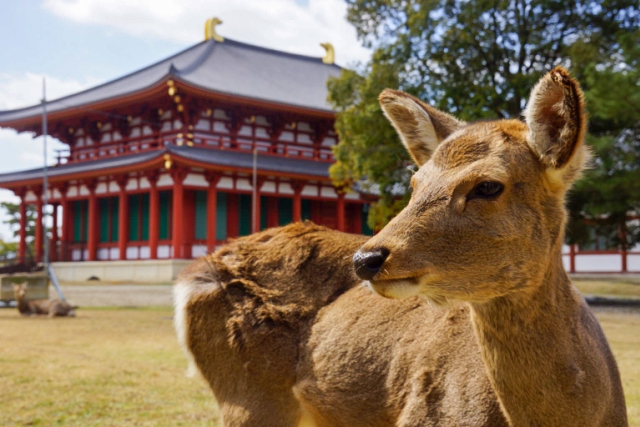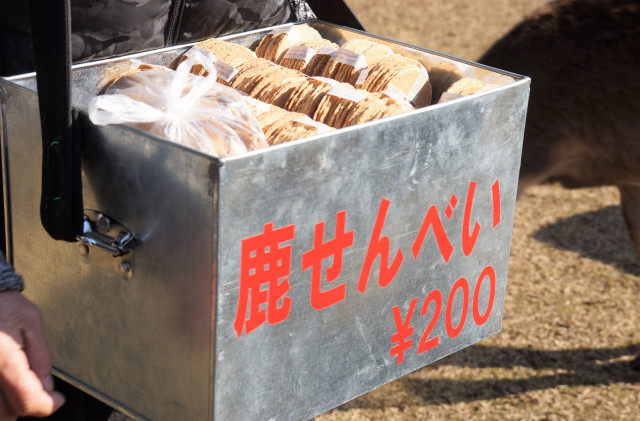
Goodwill of strangers now threatens to do the deer more harm than good.
One of the most popular tourist sites in all of Japan is Nara Park in Nara Prefecture, where people can walk amongst free-roaming deer that cross at pedestrian crossings and bow to tourists in return for senbei rice crackers.
Due to the coronavirus pandemic, however, tourist numbers have plummeted, and with international travel restrictions leaving the park emptier than it’s ever been, the deer have been hungry for rice crackers usually fed to them by visitors.
▼ Sold by vendors on the park grounds, Shika Senbei (“Deer Rice Crackers”) are a popular way for tourists to interact with the animals.
With a large number of deer seen wandering far from the park in search of food and others looking gaunt, concerned locals have recently been spotted giving the animals scraps of food. However, the Nara Deer Preservation Foundation, who helps to care for the animals, says the deer are perfectly fine without handouts from strangers, and have installed signs around the park asking visitors not to feed the deer any food other than rice crackers.
According to the foundation, a number of visitors have been giving the deer sweets and vegetable scraps to supplement the animals’ diets following the drop in tourists. This can do them more harm than good, though, and the foundation is looking to put an end to the practice by implementing a “Feeding Prohibition Campaign” from 1-28 February, patrolling the grounds at night to ensure there is no improper feeding and setting up signs at 16 places in and around the park to prohibit people from feeding the deer anything other than rice crackers.
▼ The news quickly spread online, with photos showing the signs being put in place.
「奈良のシカが飢えている」のは誤解です…鹿せんべい以外は餌やり厳禁 : 社会 : ニュース : 読売新聞オンライン https://t.co/a5wEux15fs
— Takashi Tahara (@coopersclubman) February 2, 2021
The foundation also shared the signs on their official Twitter account, showing what types of food are prohibited: vegetables, bread, bentos, and snacks like potato chips.
奈良公園の鹿ストップえさやりキャンペーンを開始しました。詳しくは奈良の鹿愛護会スタッフブログをご覧ください。https://t.co/CnDZgYeM4F pic.twitter.com/WF3s6FeVdu
— 一般財団法人奈良の鹿愛護会 公式アカウント (@nara_aigokai) February 2, 2021
They also shared information about the deer to put everyone’s minds at ease, saying the animals have been living wild at Nara for over 1,300 years. The deer can safely survive on grass, leaves and acorns found inside the park, and food like bread and snacks are not part of their natural diet.
According to the foundation, deer crackers have been used by tourists in the park since the Edo Period (1603-1868), and are fine for the animals as a supplement to their natural diet.
Hiroyasu Takeda, director of the Nara Park Administration Office, reinforced the importance of keeping the animals on their usual diet, saying:
“Deer are wild animals and will not starve even if the number of tourists decreases. We’d like people to stop giving the deer food that isn’t deer senbei.”
Given that a number of deer have been showing signs of dependence on rice crackers, with some eating up to 200 a day, the absence of tourists actually presents a good opportunity for the animals to return to a more healthy natural diet. There are already promising signs that their health is improving, as a recent study showed deer droppings have become firmer and darker compared to before the pandemic, which indicates they’re eating more grass than usual.
So next time you’re in Nara and wanting to give the deer a bit of your lunch in return for a bow, don’t forget that the deer have been surviving without handouts from humans for centuries. Although the foundation does help them out in the dead of winter with shikayose, the annual calling of the deer with acorns and a French horn.
Sources: Yomiuri Shimbun via Goo News via Otakomu
Photos © SoraNews24
● Want to hear about SoraNews24’s latest articles as soon as they’re published? Follow us on Facebook and Twitter!




 Nara deer “addicted” to rice crackers, lose weight with no tourists to feed them
Nara deer “addicted” to rice crackers, lose weight with no tourists to feed them Deer in Nara Park outnumber visitors, display baffling summer gathering behaviour
Deer in Nara Park outnumber visitors, display baffling summer gathering behaviour Increased tourist numbers in Nara Park are affecting the size of its deer population
Increased tourist numbers in Nara Park are affecting the size of its deer population The poo from Nara Park’s deer is changing because of the coronavirus pandemic
The poo from Nara Park’s deer is changing because of the coronavirus pandemic Nara deer dies with four kilos of plastic in its stomach, tourists cautioned to feed animals properly
Nara deer dies with four kilos of plastic in its stomach, tourists cautioned to feed animals properly Non-tourist trap fish market in northeastern Japan captures our hearts with amazing sashimi
Non-tourist trap fish market in northeastern Japan captures our hearts with amazing sashimi Kyoto becomes City of Yokai, with Night Parade of One Hundred Demons festival this autumn
Kyoto becomes City of Yokai, with Night Parade of One Hundred Demons festival this autumn Japan’s newest life-size Gundam is finished, receives Shinto blessing in Osaka【Video】
Japan’s newest life-size Gundam is finished, receives Shinto blessing in Osaka【Video】 Chinese drivers flocking to Japan for quick and easy route to international licenses
Chinese drivers flocking to Japan for quick and easy route to international licenses One of Japan’s most awesome rail passes, the Seishun 18 Ticket, just got a lot less awesome
One of Japan’s most awesome rail passes, the Seishun 18 Ticket, just got a lot less awesome No train, no hotel – How to do an overnight bus trip to Kanazawa from Tokyo – Part 1【Photos】
No train, no hotel – How to do an overnight bus trip to Kanazawa from Tokyo – Part 1【Photos】 McDonald’s Japan debuts new anime girl mascot character with incredibly long name
McDonald’s Japan debuts new anime girl mascot character with incredibly long name Korean basketball coach humiliates player live on TV, tapes his mouth shut
Korean basketball coach humiliates player live on TV, tapes his mouth shut We try a delicious hidden gem in Fukuoka, unknown to even Japanese people
We try a delicious hidden gem in Fukuoka, unknown to even Japanese people Studio Ghibli releases new “Butterflies in the Forest” Totoro towels
Studio Ghibli releases new “Butterflies in the Forest” Totoro towels What’s the deal with akebi, the perfectly purple, alien-like fruit that’s in season now in Japan?
What’s the deal with akebi, the perfectly purple, alien-like fruit that’s in season now in Japan? Totoro, Calcifer, other Ghibli stars returning as humidifiers ahead of Japan’s dry winter days【Pics】
Totoro, Calcifer, other Ghibli stars returning as humidifiers ahead of Japan’s dry winter days【Pics】 Is downtown Tokyo’s crazy cheap 290-yen bento boxed lunch shop still around, and is it still cheap?
Is downtown Tokyo’s crazy cheap 290-yen bento boxed lunch shop still around, and is it still cheap? Meet the kind Japanese grandpa who takes photos for tourists at the Hachiko statue in Shibuya
Meet the kind Japanese grandpa who takes photos for tourists at the Hachiko statue in Shibuya Studio Ghibli releases new mug tumblers featuring anime movie characters
Studio Ghibli releases new mug tumblers featuring anime movie characters How to power up the coolest cheap souvenir from Nintendo’s official shop with a trip to Daiso
How to power up the coolest cheap souvenir from Nintendo’s official shop with a trip to Daiso Why was the Lithuanian ambassador to Japan working in a fast food beef bowl joint in Tokyo?
Why was the Lithuanian ambassador to Japan working in a fast food beef bowl joint in Tokyo? Line of foreign tourists leads us to Akihabara’s meatiest fatty ramen【Taste test】
Line of foreign tourists leads us to Akihabara’s meatiest fatty ramen【Taste test】 Japanese convenience store Family Mart announces abolishment of eat-in spaces
Japanese convenience store Family Mart announces abolishment of eat-in spaces Studio Ghibli releases new insect whistle necklace from Nausicaä of the Valley of the Wind
Studio Ghibli releases new insect whistle necklace from Nausicaä of the Valley of the Wind Totoro sequel anime Mei and the Baby Catbus will screen at Ghibli Park this winter
Totoro sequel anime Mei and the Baby Catbus will screen at Ghibli Park this winter Starbucks Japan unveils Halloween Frappuccino for 2024, and it’s like drinking a magic spell
Starbucks Japan unveils Halloween Frappuccino for 2024, and it’s like drinking a magic spell Evangelion creator Hideaki Anno returning to anime with new project for 50-year-old franchise
Evangelion creator Hideaki Anno returning to anime with new project for 50-year-old franchise Studio Ghibli releases new Howl’s Moving Castle goods that capture the magic from the anime movie
Studio Ghibli releases new Howl’s Moving Castle goods that capture the magic from the anime movie Adult Jam Bread causes a stir at store in Tokyo
Adult Jam Bread causes a stir at store in Tokyo Right now is the peak time to go to Tokyo’s most-beautiful-view beer garden【Photos】
Right now is the peak time to go to Tokyo’s most-beautiful-view beer garden【Photos】 Pizza Hut adds a “Guilty Secret” sandwich to its menu for a limited time
Pizza Hut adds a “Guilty Secret” sandwich to its menu for a limited time McDonald’s new Happy Meals offer up cute and practical Sanrio lifestyle goods
McDonald’s new Happy Meals offer up cute and practical Sanrio lifestyle goods Foreign tourists on Shinkansen bullet train break suitcase etiquette, angering local passengers
Foreign tourists on Shinkansen bullet train break suitcase etiquette, angering local passengers [Deleted] Article written for April Fool’s Day 2018
[Deleted] Article written for April Fool’s Day 2018 Japanese government to make first change to romanization spelling rules since the 1950s
Japanese government to make first change to romanization spelling rules since the 1950s Foreigner’s request for help in Tokyo makes us sad for the state of society
Foreigner’s request for help in Tokyo makes us sad for the state of society Ghibli founders Toshio Suzuki and Hayao Miyazaki contribute to Japanese whisky Totoro label design
Ghibli founders Toshio Suzuki and Hayao Miyazaki contribute to Japanese whisky Totoro label design Tokyo’s most famous Starbucks is closed
Tokyo’s most famous Starbucks is closed Princesses, fruits, and blacksmiths: Study reveals the 30 most unusual family names in Japan
Princesses, fruits, and blacksmiths: Study reveals the 30 most unusual family names in Japan Doraemon found buried at sea as scene from 1993 anime becomes real life【Photos】
Doraemon found buried at sea as scene from 1993 anime becomes real life【Photos】 Deer in Nara Park mysteriously disappear during this year’s shikadamari season
Deer in Nara Park mysteriously disappear during this year’s shikadamari season Nara unveils new vending machines that sell deer crackers
Nara unveils new vending machines that sell deer crackers Nara deer leave park, head to station for food as tourist numbers tumble due to coronavirus
Nara deer leave park, head to station for food as tourist numbers tumble due to coronavirus Nara deer stampede into marathon, hit runner in their path
Nara deer stampede into marathon, hit runner in their path Nara deer shikadamari mystery deepens as tourists return to Nara park
Nara deer shikadamari mystery deepens as tourists return to Nara park Deer killed by man with axe in Nara
Deer killed by man with axe in Nara Nara’s “deer cookie” rice crackers get their first price increase in 28 years
Nara’s “deer cookie” rice crackers get their first price increase in 28 years Adorable bowing deer in Japan shows you can be concurrently cute and courteous【Video】
Adorable bowing deer in Japan shows you can be concurrently cute and courteous【Video】 Nara Park’s first baby deer of the year has been born, is totally adorable【Video】
Nara Park’s first baby deer of the year has been born, is totally adorable【Video】 During Golden Week rush, Nara deer so overwhelmed with rice crackers they wear them as hats
During Golden Week rush, Nara deer so overwhelmed with rice crackers they wear them as hats An unexpected visitor stops by our cheap Japanese house in the countryside【SoraHouse】
An unexpected visitor stops by our cheap Japanese house in the countryside【SoraHouse】 Locals (deer) shut visitors out of Nara Park cool-down misting station【Video】
Locals (deer) shut visitors out of Nara Park cool-down misting station【Video】 Nara, Japanese city famous for its streets of tame deer, begins culling program within city
Nara, Japanese city famous for its streets of tame deer, begins culling program within city Nara considering increasing number of deer that can be killed each year, expanding culling zone
Nara considering increasing number of deer that can be killed each year, expanding culling zone Nara’s deer continue their summertime tradition of commandeering one of the city’s streets
Nara’s deer continue their summertime tradition of commandeering one of the city’s streets
Leave a Reply